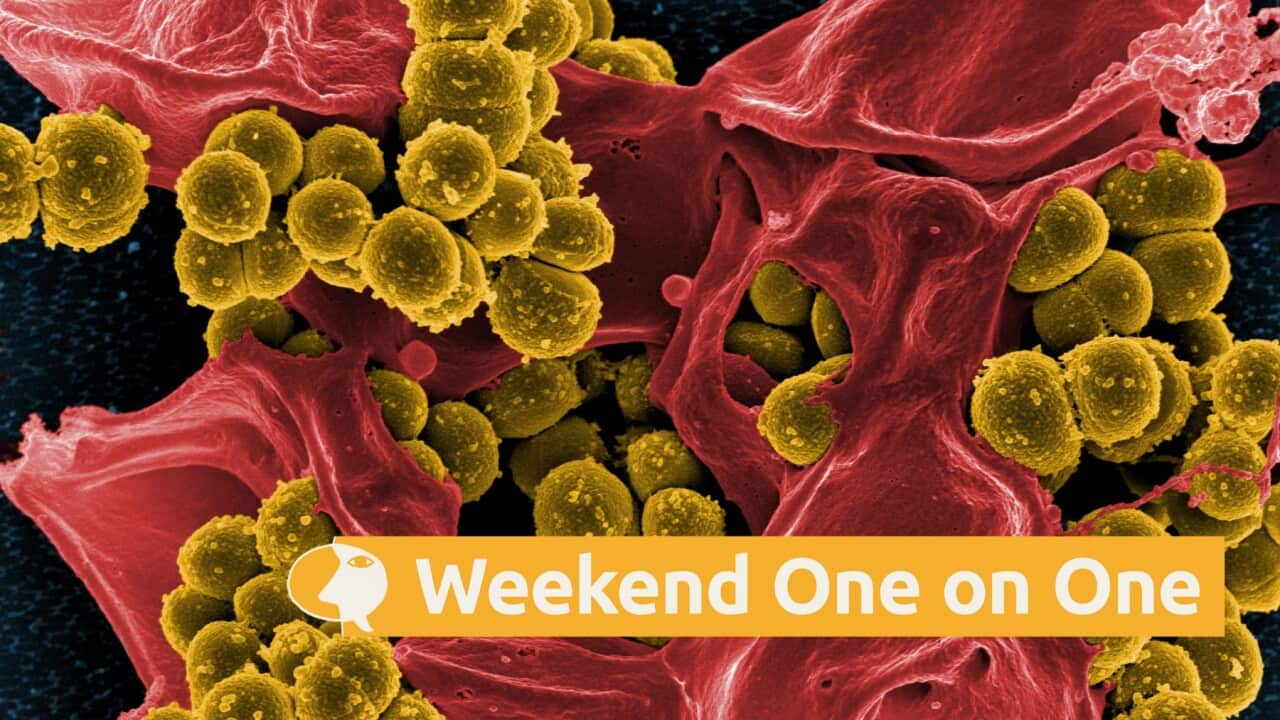Listen to Australian and world news, and follow trending topics with SBS News Podcasts.
TRANSCRIPT
Tiffany Leon is a dietitian from Maryland in the United States - and also the mum of two boys.
When they were little, she followed a new guideline - first issued in the US in 2015 - to introduce peanuts to them at an early age.
“As a dietitian, I practice evidence-based recommendations throughout my career, and so when someone told me, 'Oh this is this is how it's done now, these are the new guidelines', I just thought, 'Oh okay, well this is what we're gonna do then'... So around four, around five months we like sat him in the chair and fed him a few of the lower risk allergenic foods. I think we did like green beans, infant cereal, you know, did a few things first. And then we just jumped in with two feet.”
The reason for this change in the Leon family is because up to that point, parents had been told to avoid exposing their children to potentially risky foods until they were three years old, in the hope of avoiding a full blown allergy.
Peanut allergy is one of the most common of these conditions, caused when the body’s immune system mistakenly identifies proteins in peanuts as harmful and releases chemicals that trigger symptoms like hives, respiratory issues, and sometimes, life-threatening anaphylaxis.
In that event, as this parent told SBS in August, it can become an all-consuming situation.
“Allergies aren't just an inconvenience. They really do shape every aspect of families' lives.”
New guidance aimed at avoiding this kind of outcome came out in a number of countries after Gideon Lack at King’s College London published the groundbreaking Learning Early About Peanut Allergy, or LEAP, trial, work that suggested earlier exposure might actually help children.
So says Dr David Hill, from the Children's Hospital of Philadelphia.
“The LEAP study... showed that if we actually introduce that allergen to children by mouth, having them eat it, before they're introduced to it via their skin, we can reduce the risk that that child's going to go on to develop the food allergy itself.”
Virginia's children appear to have avoided developing a peanut allergy - and now Dr Hill has published a new study after analysing electronic health records from dozens of paediatric practices to track diagnoses of food allergies in young children before, during and after the new guidelines were issued.
It's found thousands of other children in the US have also avoided developing peanut allergies after their parents followed the same dietary advice as the Leons.
“What our data shows is that because of, or at least associated with those early introduction guidelines, there's about 60,000 less kids with food allergy today than there would have been. And that's a remarkable thing, right? That's the size of some cities.”
Associate Professor Rachel Peters is the Population Health Research Program Lead at the Murdoch Children's Research Institute's National Allergy Centre of Excellence.
She's been part of research at the Institute that's also exploring these issues.
According to the charity group Allergy and Anaphlyaxis Australia, peanut allergy is one of the most common food allergies in childhood in Australia, affecting 3 percent of infants up to the age of 12 months.
Dr Peters says at least two major studies have been completed in Australia in the last decade to explore what might prevent such allergies in the first place - one study happening before Australia adopted new infant feeding guidelines in 2016, and one after that date.
“We had two population-based studies recruited in the same region, which was Melbourne, Australia... So we had two cohorts recruited with exactly the same methods, but 10 years apart... Firstly, we measured what parents were doing in terms of infant feeding practices and we had some very promising results showing that nearly 90 percent of babies today are being fed peanut in the first year of life, and this is what the guidelines currently recommend... (and secondly) we certainly showed a modest reduction in food allergy, but perhaps not as much as we were expecting.”
Dr Peters says the Australian findings suggest much more study needs to be done to establish the various causes of food allergies.
“Even though we are certainly starting to see a reduction in the rates of peanut allergy in Australia, they are still quite higher - and higher than in some other countries around the world, and higher than what was shown in this American study as well.”
The Associate Professor says some of that research has offered some promising evidence.
“For example, there is a large trial underway examining whether Vitamin D supplementation in the first year of life is helpful for preventing food allergy... There's a number of studies that show in babies who live further from the equator - so they're geting less exposure to Vitamin D and less sunlight - that they're more likely to develop a food allergy. We even see that within Australia. We have higher rates of food allergy in Melbourne compared to what we see in Queensland.”
Back in the United States, Dr Hill has been encouraged by his findings.
“It's amazing for me to be able to sit here with you today and say, you know, for the first time in modern history, not only have we reduced the rate of food allergy diagnoses, but we're actually lower than we were five years ago.”
In the meantime, Dr Peters says parents can put their minds at ease.
“Parents should feel comfortable and reassured by this sort of research. Parents should feel confident with what they're doing today based on the ((infant feeding)) recommendations.”













